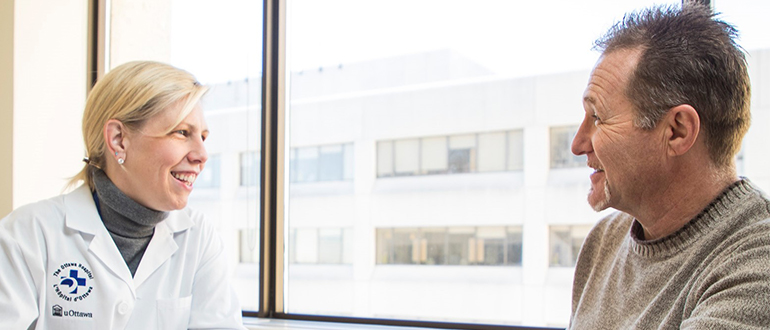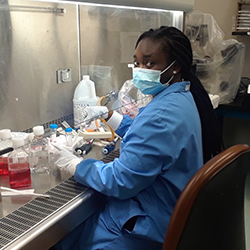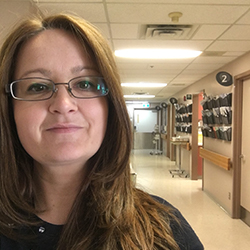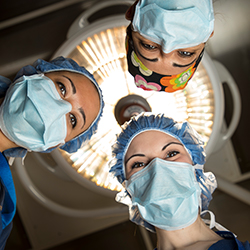toh
Tissue Research

From surgery to discovery: innovative tissue collection process to fuel breakthroughs
The Ottawa Hospital’s Global Tissue Consenting and Collecting Program (GTC) is designed to ensure that all patients are given the opportunity to participate in research, while helping our scientists access human tissue samples that are critical to making new discoveries.
If you are a patient at The Ottawa Hospital preparing for a surgery you may have been or will be asked by your surgeon if you agree to have a small piece of your tissue collected after the surgery and used for research purposes.
This is part of a new and exciting project at The Ottawa Hospital – GTC or Global Tissue Consenting and Collecting Program – designed to ensure that all patients are given the opportunity to participate in research, while helping our scientists access human tissue samples that are critical to making new discoveries.
Tissues collected through GTC are being used for a wide variety of approved projects to study cancer and find better treatments for various diseases.
This new streamlined process has the potential to accelerate our ability to make new discoveries and find better treatments for various diseases. Working under an umbrella Research Ethics Board (REB) protocol, a GTC Working Group manages the collection and distribution of this tissue and ensures that patients’ personal health information is protected.
The program is managed by “Tissue Navigator” Edita Delic, a clinical research associate with a track record in tissue collection protocols and procedures for research.
What do patients need to know?

When a patient provides consent to GTC, only surplus tissue, not needed for diagnosis or to help with treatment decisions, will be used for research purposes. Any personal health information collected will be protected, as per the regulations of the Research Ethics Board. The patient’s treating surgeon may or may not be involved in the research conducted with the surplus tissue. Patients will be asked to consent to GTC at the same time as they are asked to consent to their surgery. This may be done as part of a “virtual visit” with their surgeon, via telemedicine, Zoom call or phone call or may be done in person. Consent for GTC is completely voluntary, and patients are not required to participate.
What surgeons, nurses and clinical administration need to know?
The operative consent is now a legal-size document that includes checkboxes for the patient to initial, indicating if they are willing to participate in tissue collection for research. The consent is also available electronically via EPIC. An information sheet is also provided to the patient, which includes contact information for the “Tissue Navigator” if they have additional questions. No changes will be made to how tissue will be transported from the OR to the pathology lab.
What do researchers need to know?

Any researcher can make use of the GTC process, including current protocols that collect tissue. The collection program is not a biobank but will provide fresh tissue to researchers. The GTC is registered with the Canadian Tissue Repository Network (CTRN). If you are interested in obtaining tissue for research or have a currently enrolling tissue collection protocol, please contact Edita Delic, the TOH “Tissue Navigator” at GTC@toh.ca to find out how you can make use of this complimentary service.
Research Ethics Board approved research studies that collect tissue as part of the GTC (with Principal Investigators)
Brain Cancer
- REB 2012016601H – PriGO Specimen collection program: Culture of Glioblastoma Brain Tumor Cells from Patient Surgical Samples for Cancer Biology Research – Dr. Ian Lorimer

Breast Cancer
- REB 20190638-01H – Uncovering mechanisms of resistance in CKD inhibition in breast cancer – Dr. Christina Addison
- REB 20220094-01H – The Use of Patient-Derived Tumor Tissue as a Preclinical Tool to Facilitate Identification, Validation and Monitoring of Factors Driving Cancer Development and Progression. – Dr. Christina Addison
- REB 20180890-01H – Studies to compare Primary Mammary Gland Stem Cells from BRCA1/2 Mutation Carriers and Normal Individuals (breast cancer)– Dr. Christine Pratt
Colorectal Cancer
- REB 20200159 -01H, uOttawa REB H-07-20-6027- Impact of anticancer drugs on patient-derived Colorectal Tumor-Initiating Cell populations – Dr. Yannick Benoit
- REB 20160284-01H – Circulating microRNAs a promising novel class of diagnostic biomarkers: application to early colorectal cancer screening – Dr. Avijit Chatterjee
Ovarian Cancer
- REB 1999540-01H – Ovarian Carcinoma Tissue Bank – Barbara Vanderhyden
- REB 20140075-01H – Reversing the Immunosuppressive Tumor Microenvironment with Oncolytic viruses – Dr. Barbara Vanderhyden
- REB 20150646-01H Biomarkers for early diagnosis and chemoresistance in epithelial ovarian cancer – Dr. Benjamin Tsang
Penile and Testicular Cancer
- REB 02000310-01H – Multi-modality imaging of penile and testicular cancers and mimics: Clinico-Radiologic-Pathologic correlation – Dr. Nicola Schieda
All other Cancers
- REB 2011884-01H – Perioperative Human Blood and Tissue Specimen Collection Program – Dr. Rebeca Auer (collection for John Bell, Luc Sabourin, Michele Ardolino and J.S. Diallo)
- REB 20180221-02H – Immunoprofiling of human tumors – Dr. Michele Ardolino
- REB 20220124-01H – Ex Vivo Studies of oncolytic virus infection in human cancer and normal tissue – Dr. John Bell
- REB 20230072-01H – Research on Anticancer treatments utilizing fresh surplus tissues & The MISO Chip tumor explant platform – Dr. Rebecca Auer
Non-Cancer Research
- REB 20200717-01H – Cellular and Molecular Changes in Intra-Articular Adipose Tissue Associated with Ageing and Arthritis in The Hip Joint – Dr. George Grammatopoulos
- REB 20170684-01H – Improving our understanding of periprosthetic joint infections – Dr. Hesham Abdelbary
- 20230499-01H – Establishment of patient-derived human cancer cells, normal tissue and immune cells from surgical
- specimens (Project 520) – Dr. Rebecca Auer and Dr. John Bell
- 20210753-01H – Reprogramming of human cortical pericytes into cortical neurons in culture – Dr. Eve Tsai and Dr. Jing Wang
- 20230568-01H – Post Lumbar Puncture Tissue Collection and management – Dr. Giulia Fadda
- 20230621-01H – Advanced characterization of changes in the zone of calcified cartilage in osteoarthritis (ZCC) – Dr. Simon Garceau
- 2004027-01H – Creation of a Research Tissue Bank (OTT 04-03, OHREB #2004027-01H) – Dr. Harman Sekhon
- 20230191-01H – Post-Surgical Tissue collection and management of Fresh skin tissue samples for research use – Dr. Rebecca Auer
- 20240622-01H – Endothelial dysfunction in the pathogenesis of hypertensive nephropathy in humans – Dr. Kevin Burns
Steering committee member departments
Surgical oncology (breast, sarcoma, urology, head and neck, gynecology, melanoma and skin), Medical oncology, Radiation oncology, Molecular oncology, EORLA, Pathology, TOH Cancer Program, TOH Innovation and Quality, OHRI Cancer Therapeutics Program, University of Ottawa, Ontario Tumor Bank, Ottawa Health Sciences Network – Research Ethics Board, Ottawa Hospital Research Institute Regulatory, Patient Advocate.
Last updated on: October 23rd, 2024


 To reset, hold the Ctrl key, then press 0.
To reset, hold the Ctrl key, then press 0.